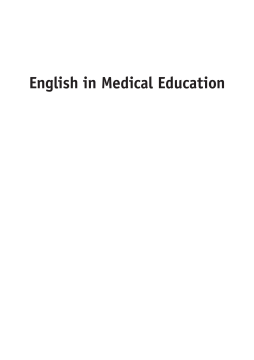
Additional Information
Book Details
Abstract
This book addresses recent developments in medical and language education. In both fields, there have been methodological shifts towards 'task-based' and 'problem-based learning'. In addition, both fields have broadened their focus on clinical expertise and linguistic skills to address issues of cultural competence. English in Medical Education responds to these changes by re-imagining the language classroom in medical settings as an arena for the exploration of values and professional identity. The chapters cover topics such as the nature of cultural competence; how to understand spoken discourse in a range of medical settings; the use of tasks and problems in language education for medics; the development of critical skills and the use of literature and visual media in language education for doctors. It will interest everyone teaching English for Medical Purposes.
This is an unusual book, and an unusually interesting one, bringing together two distinct traditions - academic medicine and English for Medical Purposes. The authors' claim that the book represents a 'change of direction' is well substantiated - it's full of good, sophisticated, intelligently argued ideas, but always a pleasure to read. Those involved in the development of EMP courses will gain real insight into how medical educators perceive medical language, while the actual learning tasks offered by way of example are stimulating, original and tremendously useful. The book would also be of value to medical educators who want to broaden their understanding of the challenges faced by non-native speaker medical students or doctors.
John Skelton, College of Medical and Dental Sciences, University of Birmingham, UK
Peih-ying Lu is Associate Professor of English, Kaohsiung Medical University, Taiwan and Honorary Research Fellow at the University of Glasgow. She has published on intercultural language education in Taiwan, intercultural language education and citizenship, and on the use of art, literature and problem-based learning in medical education.
John Corbett is Professor of English at the University of Macau and Honorary Research Fellow at the University of Glasgow. He has published widely on language education and on corpus-based linguistics. Among his books are An Intercultural Approach to English Language Teaching (Multilingual Matters 2003) and Intercultural Language Activities (Cambridge University Press, 2010).
Peih-ying Lu and John Corbett have written an innovative and valuable book with memorable chapters highlighting and analyzing vivid examples of physician-patient dialogue. They provide fresh approaches and thoughtful discussions regarding exploring patients' cultural beliefs about health. This book is an essential resource for medical educators and faculty interested in improving cross-cultural care education.
Helen M. Shields, Beth Israel Deaconess Medical Center, Harvard Medical School, USA
The authors have written a highly readable, thought-provoking book in response to a rapidly developing educational field. They successfully highlight the parallels between inter-cultural communicative competence and cultural competence in medical education and suggest valid ways of exploring medical language and medical talk by using contemporary digital resources.
Catherine Richards, University of Swansea, Wales
In English in Medical Education, the authors take a fresh and very contemporary look at the topic of language education in medicine, examining the importance of cross-cultural competence in both language and medical training and discussing the methodological shift towards 'task-based' language learning and 'problem based' medical training. This is a highly readable, thought-provoking book which any EMP teacher will find useful.
Catherine Richards
Underpinning this engaging and wide-ranging book is the idea that being a doctor in today's globalised societies means becoming an intercultural communicator and ethnographer. Drawing on medical anthropology, sociology and humanities, this book contributes towards establishing a new medical sub-discipline: medical linguistics. It brings together widely discussed notions of intercultural competence from language education with medical concerns about working with diversity. With an elastic view of language, it landscapes in an exciting range of resources. It is packed full of practical suggestions as well as being theoretically informed and analytically driven. This is a really useful read for medical educators throughout the world.
Celia Roberts, Centre for Language, Discourse and Communication, King's College London, UK
Table of Contents
| Section Title | Page | Action | Price |
|---|---|---|---|
| Contents | v | ||
| Acknowledgements | ix | ||
| 1 Introduction – English in Medical Education | 1 | ||
| 2 Intercultural Communicative Competence in Medical Settings | 15 | ||
| 3 Task Design in Language and Medical Education | 33 | ||
| 4 Exploring Medical Language | 54 | ||
| 5 Medical Talk | 81 | ||
| 6 Critical Cultural Awareness in Medical Education | 117 | ||
| 7 Literature and Language in Medical Education | 139 | ||
| 8 The Visual Arts in Medical Education | 157 | ||
| 9 Course Design for Intercultural Language Education in Medical Settings | 178 | ||
| References | 197 | ||
| Index | 212 |
